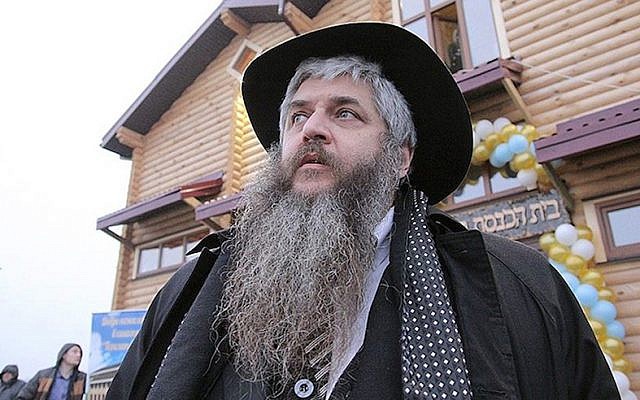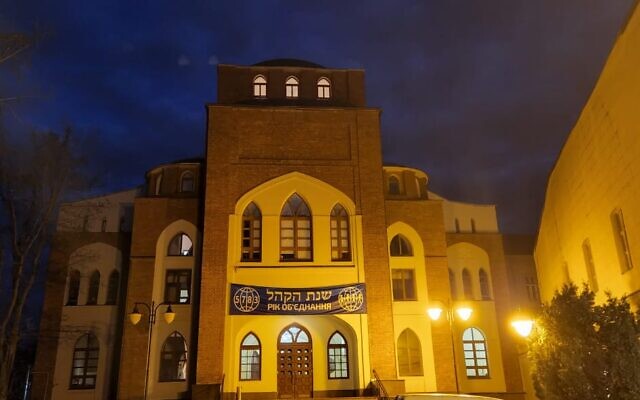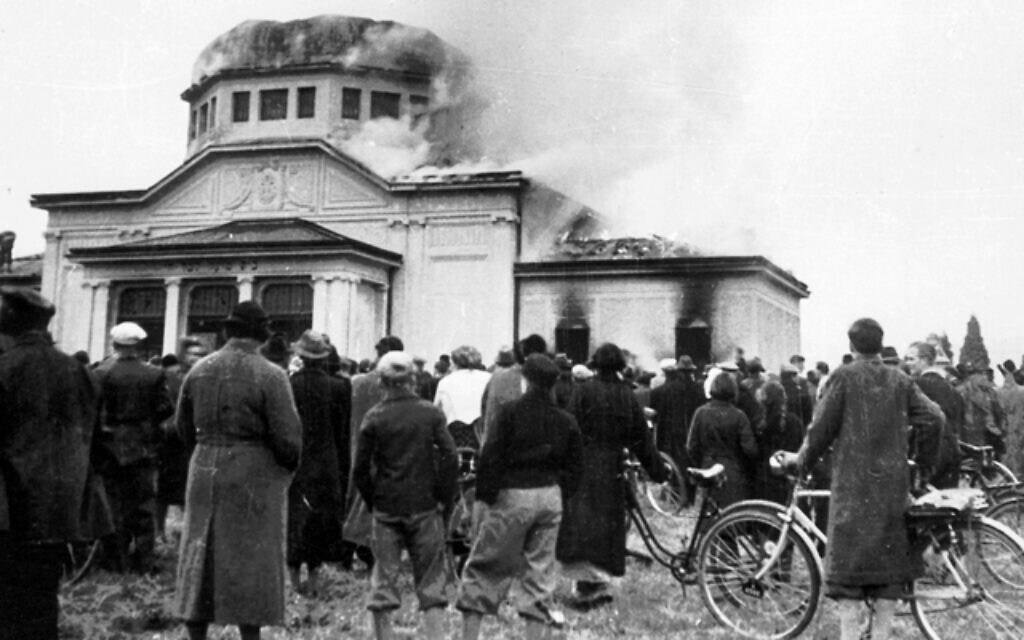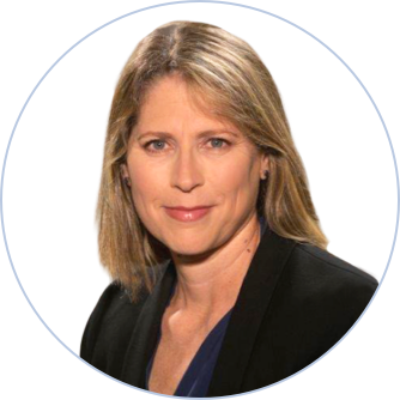Major synagogues in wartime Ukraine left their lights on Wednesday night to mark the 84th anniversary of Kristallnacht, the 1938 pogrom in which synagogues across Nazi Germany were set ablaze and at least 90 Jews were murdered.
The Brodsky Synagogue in central Kyiv, the Kharkiv Choral Synagogue and the synagogue in the Jewish village Anatevka all participated in the initiative called “Light from the Synagogue,” headed by Israel’s Religious Kibbutz Movement.
“When they asked us to participate, we were just hoping that [authorities] wouldn’t turn off the lights in the middle,” said Rabbi Yossi Azman, son of Brodsky Synagogue Chief Rabbi Moshe Azman.
Russian strikes on Ukrainian infrastructure have been causing frequent blackouts throughout Ukraine.
Unexpectedly, the historic synagogue did not suffer any outages that night.
“The point is not only to turn on a light in memory of what was,” said the younger Azman, speaking from Kyiv. “Turning on the lights today means involving yourself in things that are also a form of light — bringing Jews closer to their faith, helping the needy, etcetera.”
The rabbi said that air raid sirens are still sounding in the capital, but there have been no strikes in the city in recent days. The restaurant in the synagogue is open, services are held every day, and over the past 24 hours, he and his staff had distributed over 2,000 food packages, he said.
The Brodsky Synagogue in Kyiv, Ukraine, keeps its lights on to mark the 84h anniversary of Kristallnacht, Novmber 9, 2022 (courtesy)
Azman also oversaw the lighting in Anatevka, founded outside of Kyiv by his father in 2015 to house Jewish refugees from the fighting in Donbas. In the early days of the 2022 invasion, hundreds of Jews sheltered in the village before fleeing the war in convoys to the border.
Kharkiv Rabbi Moshe Moskowitz told The Times of Israel that the synagogue is a “pillar of light and hope for the Jewish community and the city of Kharkiv in these difficult times.”
Located only 19 miles (30 kilometers) from the Russian border, Ukraine’s second-largest city was an enticing target for Moscow, which believed that its mostly Russian-speaking population would welcome its troops as liberators from nationalist Ukrainians. Though Russian forces briefly reached the city’s center, by mid-May they had been driven back toward the border.

Rabbi Moshe Azman, founder of the Anatevka community near Kiev, February 29, 2016. (R. Litevsky/Courtesy of the Office of Rabbi Moshe Azman)
Still, the city continued to suffer from shelling, and destruction is widespread in civilian areas.
“Kristallnacht tried to break the Jewish spirit by breaking windows and synagogues,” Moskowitz said in a phone conversation. “Even in this war where the windows of our synagogue and school were smashed by bombs and rockets, the synagogue and our spirit is still burning bright more than ever.”
The Light from the Synagogue project has grown steadily over the past 15 years. Participating congregations are asked to teach about the November 1938 pogrom’s place in history, in addition to keeping the lights on until morning.
Following Kristallnacht on November 9-10, 1938, Germany faced virtually no international repercussions for the government-ignited orgy of violence in which 20,000 young Jewish men were arrested and sent to concentration camps. Historians call this lack of consequences or sanctions a “green light” for Germany to escalate toward the Holocaust.

The Kharkiv Choral synagogue in Kharkiv, Ukraine, keeps its lights on to mark the 84h anniversary of Kristallnacht, Novmber 9, 2022 (courtesy)
“The devastation of this event is significant, and what it symbolized for German Jewry proved to be deep and long-lasting,” according to Yad Vashem. “The passivity of German citizens signaled to Nazi authorities that the German public was prepared for more violence and would likely continue to be silent.”
“Kristallnacht was a point of no return,” said Dalia Yohanan, the project’s coordinator. “The world did not care and that was a signal to the Nazis,” she told The Times of Israel.
Yohanan’s father, Naftali (Kurt) Wertheim, survived Kristallnacht as a boy by hiding under a table as neighbors threw stones at his family’s windows. Soon after, Wertheim was sent on a Kindertransport rescue to Britain and later settled in Israel.
Yohanan helped launch “Light from the Synagogue” in 2008 with leaders of the World Zionist Organization (WZO). The commemoration differs from Yom HaShoah — Holocaust Memorial Day — because the focus is not on mourning.

In Graz, Austria, onlookers watch a smoldering synagogue the morning after Kristallnacht, November 10, 1938 (public domain)
More than 400 synagogues in Israel participated this year, along with hundreds of synagogues and churches outside the Jewish state, said Yohanan. In Argentina, for example, commemorations will be held at 50 synagogues, said Yohanan.
“Every year we grow a little bit more in Israel and the Jewish world,” said Yohanan.
This year, churches around the world were invited to participate, said Gidon Ariel, who runs the organization “Root Source,” which connects pro-Israel Christians with Israelis.
In Israel, the commemoration officially kicked off at the President’s House in Jerusalem, where there is a small synagogue on-site. Throughout the Jewish state, synagogues on army bases kept their lights on all night by request of the IDF’s chief rabbi.
Matt Lebovic contributed to this report.

